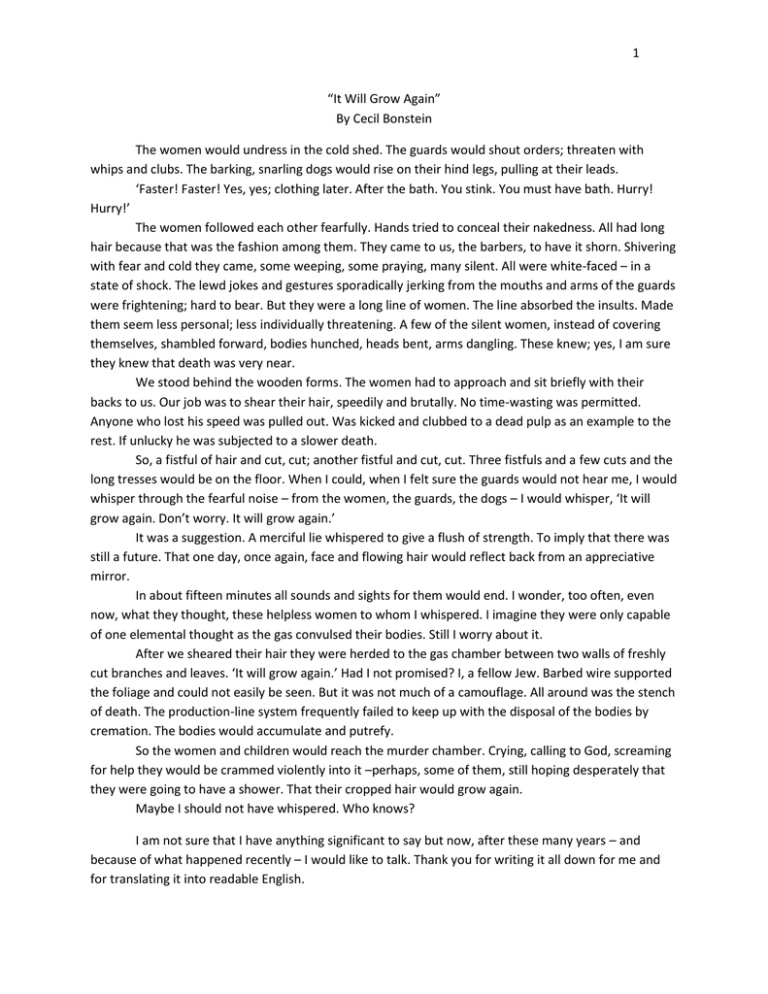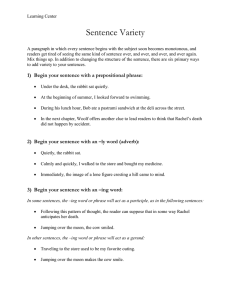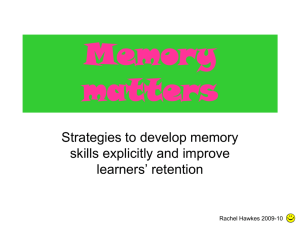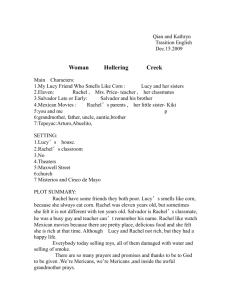“It Will Grow Again” By Cecil Bonstein The women would undress in
advertisement

1 “It Will Grow Again” By Cecil Bonstein The women would undress in the cold shed. The guards would shout orders; threaten with whips and clubs. The barking, snarling dogs would rise on their hind legs, pulling at their leads. ‘Faster! Faster! Yes, yes; clothing later. After the bath. You stink. You must have bath. Hurry! Hurry!’ The women followed each other fearfully. Hands tried to conceal their nakedness. All had long hair because that was the fashion among them. They came to us, the barbers, to have it shorn. Shivering with fear and cold they came, some weeping, some praying, many silent. All were white-faced – in a state of shock. The lewd jokes and gestures sporadically jerking from the mouths and arms of the guards were frightening; hard to bear. But they were a long line of women. The line absorbed the insults. Made them seem less personal; less individually threatening. A few of the silent women, instead of covering themselves, shambled forward, bodies hunched, heads bent, arms dangling. These knew; yes, I am sure they knew that death was very near. We stood behind the wooden forms. The women had to approach and sit briefly with their backs to us. Our job was to shear their hair, speedily and brutally. No time-wasting was permitted. Anyone who lost his speed was pulled out. Was kicked and clubbed to a dead pulp as an example to the rest. If unlucky he was subjected to a slower death. So, a fistful of hair and cut, cut; another fistful and cut, cut. Three fistfuls and a few cuts and the long tresses would be on the floor. When I could, when I felt sure the guards would not hear me, I would whisper through the fearful noise – from the women, the guards, the dogs – I would whisper, ‘It will grow again. Don’t worry. It will grow again.’ It was a suggestion. A merciful lie whispered to give a flush of strength. To imply that there was still a future. That one day, once again, face and flowing hair would reflect back from an appreciative mirror. In about fifteen minutes all sounds and sights for them would end. I wonder, too often, even now, what they thought, these helpless women to whom I whispered. I imagine they were only capable of one elemental thought as the gas convulsed their bodies. Still I worry about it. After we sheared their hair they were herded to the gas chamber between two walls of freshly cut branches and leaves. ‘It will grow again.’ Had I not promised? I, a fellow Jew. Barbed wire supported the foliage and could not easily be seen. But it was not much of a camouflage. All around was the stench of death. The production-line system frequently failed to keep up with the disposal of the bodies by cremation. The bodies would accumulate and putrefy. So the women and children would reach the murder chamber. Crying, calling to God, screaming for help they would be crammed violently into it –perhaps, some of them, still hoping desperately that they were going to have a shower. That their cropped hair would grow again. Maybe I should not have whispered. Who knows? I am not sure that I have anything significant to say but now, after these many years – and because of what happened recently – I would like to talk. Thank you for writing it all down for me and for translating it into readable English. 2 It is the first time I have spoken so freely. People, thankfully, are reluctant to ask me about my experiences but I can sense their questions. ‘What happened to his relatives and friends?’ ‘How did he manage to survive?’ ‘What did he see? What did he do?’ Well, these and many more are the sort of questions I would expect if I encouraged people to ask them. They would want me to discuss and describe and analyse; but this is something I will not do. When victims, such as we were, are in competition to survive we adapt in whatever way suits our natures. I have seen acts – a few – of such bravery and self-sacrifice... you would be amazed. And I have been sickened by acts of brutality and sadism; of deviousness and cowardice and meanness. But why describe it all? We are trained from babyhood to act against our natures. When the restraints go the torturers and murderers are set free. We men are beasts under restraint. This is the way we are. What further analysis is necessary? I am a Jew who grew up in a Polish ghetto. Like most of my fellow Jews and like most Poles I was poor. My short formal education was narrow and handicapped by religious prejudice and superstition. I learned to think in a critical way, I suppose, because I read bits of the Talmud and because I was often with my father when, after the synagogue prayers, some of the congregation gathered in groups to talk. They would discuss, and argue and speculate about God and life, about family and good and, of course, about justice and persecution. This kind of conversation is a legacy of our history. For one thing, however, we have no answer. Why do people hate and persecute us? Why do they tell lies about us? We shrug our shoulders. We spread our arms. We have no answer. Nevertheless we continue to talk and discuss – should we kill ourselves? – because in conversation there is some comfort. There came the day when all the Jews in our ghetto were assembled and taken in cattle trucks to the concentration camp. There my family and most of the rest of the people I knew were quickly and painfully murdered and I, because I was young and strong and because they needed replacement workers at the time, was spared. When I first came to England I declined a job as a barber. How could I ever be a barber again? Even now I can feel the hair I cut from those women and children. Can smell their fear. Shearing, shearing, shearing, it fell about my feet, kept falling until it reached above my ankles and I had to kick it away. The blond hair, so fine and bright, looked too optimistic; the wrong colour in this hideous camp. Dark hair was coarse and strong. Red hair, the most coarse of all to the touch but in certain lights... ah the passion, the warmth it suggested. But I sheared it off like all the other hair. And children’s hair, so delicate, so fine – strands of silk. Of course, they did not understand; did not want to have their hair cut. The length of their hair proclaimed they were big girls, grown up, not babies any more. Still, they did not resist. It was plain to see what happened to those who resisted. So they wept, and I wept inside, and they called to their mothers while I bunched their hair in my first. Just three bunches and a few quick cuts and it was gone. There was one girl; she was about fourteen. Her hair nearly reached her waist. How she must have washed and combed and groomed that hair. She covered her face with her hands as I gripped. 3 Some images I can never forget. No, I could never be a barber again. I came to live in Whitechapel because there were people in the district who knew my family. It is difficult to know whether it is safer to live in ghettos, or whether it is wiser to merge with the native population – to become green leaves among other green leaves. To disappear as Jews and let some other minority take the strain of Europe’s barbarism. Murdering Jews in the pogroms of Poland and Russia was easy, convenient. All the killers needed to do was ask the way to the nearest ghetto. Nevertheless I settled in Whitechapel. I liked the atmosphere. It was good to be among ordinary, unafraid people. In the grocery shop near where I lived I could buy familiar food like salt or pickled herring or pickled cucumbers all stored in open wooden barrels. The smell of the spices and acid sharpened the air and the appetite. I could buy a hot salt-beef sandwich and breads like brown or black rye and chola, and cakes like plava, honey cake and cheese cake... A charity, the Jewish Board of Guardians, gave me a small allowance while I trained to be a tailor. I did not like the work but it paid a small wage and it enabled me to begin, gradually, to adjust to the new, gentle, much more tolerant society where I now found myself. I rented a room in a street not far from the Longdon Hospital and furnished it with second-hand furniture. However, I bought a new mattress, one of the firm padded types without springs. It was soft compared to the stone floor or the wooden planks of the camp. Later I bought an old bookcase which I gradually filled with second-hand books. Of course I had no photographs. The blank walls and the empty mantelpiece had to serve as my family memorial. Sometimes I would stare at the wall and try to project my memories of home upon it. What else could I do? I mentioned my firm mattress. Do you know, I never did discover – I did not wish to enquire – what the Germans did with all their hair. Did they use it to pad mattresses and armchairs? The fabric of some of these must have thinned with wear. Some hair must have seeped out – must still be coming out and floating to the floors of their bedrooms and their living rooms. What do they say when this happens? What do they think? Do they recognize it as human hair? The hair of murdered women and children? And wigs! They must have made wigs from some of the hair. I try not to think about it. I was lonely, of course. Indeed, in those early months I preferred to be alone. The work did not satisfy me – but how many non-professional people enjoy their work? Men and women hunched forward all day, sewing, machining, snipping, working at speed. The windows frosted with dirt; unshaded dust-coated light bulbs always alight; rough wooden plank floors patterned with discarded bits of material; steam rising from garments being pressed; the smell of new cloth and dust and sweat... Rachel, a seamstress, worked at a table at right-angles to mine. I thought she was different from the other women and girls. When spoken to she always responded with a charming smile and a few words. However, she hardly ever started a conversation. It seemed to me that she was either shy or that she did not want to encourage closer relationships. We had caught each other’s glances – just fleeting moments when our eyes met – and I felt that she might be vaguely interested in me. However, not being confident with women I had never said anything to her other than ‘Good morning’ or ‘Good night’ in the English way. Still, these simple words rewarded me with a smile. A small thing, yet it was something to treasure in these surroundings. 4 On a dull day, grey in the workshop, grey outside, everyone in a grey mood, one of the pressers decided to have fun. He deposited his pressed work and, returning to his table, made a wide detour as he blundered between the close-packed tables. When he reached a position directly behind Rachel he gripped her firmly below the waist. Pressing heavily against her he pretended he was having difficulty getting past. She struggled to turn; to get away from him, but his weight was too great. After a few seconds he stepped back. ‘`Scuse me Rachel,” he said, ‘you’re just a bit too fat for me.’ She swung round, long black hair swinging; small hands pressed flat against his chest, she tried to push him away, but could not budge him. He roared with laughter at her puny efforts. ‘`Ere Rachel,’ he bellowed, ‘you’ve gone all white. What `ave yer gone all white for?’ There was a break in her voice as she said, ‘Keep your hands to yourself.’ ‘Push `im `arder Rachel,’ someone shouted. ‘Kick `im in the goolies.’ ‘Pick on someone yer own bloody size,’ one of the women shouted. ‘I bet `e won’t touch `er again.’ The presser roared. ‘You’re on.’ Now that, as he saw it, he had broken the ice with stuck-up Rachel, and the boss was out of the room, he was ready for some real sport. Rachel, small, slim, powerless against his size and strength, faced him defiantly. I was momentarily reminded of the despair and terror of all those other helpless women. As he teasingly stretched a hand toward her I shouted, ‘Leave her alone.’ He swung round, glaring, fists bunched. I grabbed the heavy tailor’s scissors and help it point up toward his face. Someone touched my arm. ‘It’s just a joke,’ he said. I pushed him away and kept the scissors raised. ‘I told you, get away.’ The presser was uncertain. His fists unclenched. ‘`Ere, look at der brave man wiv der scissors. Can’t a man `ave a joke wiv a girl anymore?’ His tone was whiney. A grown-up boy frustrated. He slouched away. Soon his iron was thumping fast and loud – a strong man’s punching reply to me and to Rachel and to everyone in the room. I really think – it is terrible to admit this – I think I would have killed him if he had touched her again. But the presser, I must not be too hard on him, brought Rachel and me together. Later, when it was time to go home, she came over, touched my arm. ‘Thanks,’ she said. ‘You needn’t have, really. I can cope with men like him.’ I laughed. She also laughed. I suppose she weighed less than eight stone. Was only a little over five feet tall, while he was at least six feet, and heavy. Her brown eyes gazing gratefully into mine as she spoke in her soft voice did what any attractive woman’s grateful eyes and soft voice would do to a susceptible and lonely man. It is not necessary for me to tell you the details of our subsequent courtship. We began to meet regularly. We talked, we went to the cinema, walked in the country, listened to music – you know how these things go. Gradually images of her began to dispel the awful memories which, when I was alone, had previously dominated my thoughts. Rachel told me that she had for two years been taking a commercial course at evening class. Her parents were immigrants from Poland. Her father, a tailor, had always hated her going into what he called the Sweatshop. A few months after the incident with the presser I happily celebrated with her 5 and her parents Rachel’s appointment as a clerk to an accountancy firm in Holborn. I missed her presence a few feet away from me but I was glad she was out. The presser never spoke to me again. Rachel’s parents wanted a synagogue wedding and I did not. It was a Friday night. Bella, Rachel’s mother, a shawl over her head, had lit the candles and, hands waving over them, had whispered a Sabbath prayer – plus a few quiet words of her own. We had eaten a traditional dinner of chicken soup and boiled chicken. ‘So what do you want?’ said Rachel’s father. ‘Do you want my Rachel to marry in a Registry Office? Is that right, do you think?’ Rachel and her mother, unhappy and worried, were sitting in the large, beige armchairs. He turned to them for support. ‘A marriage like that. What is it, eh? Tell me is that a proper marriage? What is wrong with the synagogue?’ He was a tall, thin man. He gesticulated with extravagant arm movements as he spoke. ‘I’ll tell you what’s wrong,’ I said. ‘A synagogue is a place where prayers are said and I’ve heard all the prayers I ever want to hear.’ ‘All right, all right, I understand. I know. It was terrible. Absolutely terrible what you went through. We all agree. But for this you should pray more than all of us. Don’t you see? For your poor family you should pray. Who will pray for them if you don’t? And you should thank God – yes, you should thank God that you came out alive.’ ‘But why were we there?’ ‘You ask me why! Am I God? Do I know all the answers?’ ‘Listen,’ I said, ‘Let me tell you about prayers and the Golem of our concentration camp.’ He shrugged. ‘Now he’s going to tell us a story. All right, I’ll listen. At least you can’t say I don’t listen, but I still want my Rachel to have a synagogue wedding.’ I glanced at Rachel and her mother; at the white, flickering candles. I would rather they did not hear what I had to say but I could not very well ask them to leave. So I began: ‘When at night we were in our shed trying to sleep – it was cold, very cold. We lay without any covering on wooden platforms. Among us was a bearded, orthodox Jew who, despite all he had seen, still believed, deeply believed, in God. And he also believed the story of the Golem. That the Golem was once sent by God to save the Jews. Maybe you know the story?’ ‘I have heard of the Golem. Who hasn’t? But Rachel and her mother, they may not know.’ “All right,’ I said, ‘I’ll first remind you about the Golem of Prague. ‘According to legend, when the Jews were being rounded up in the ghetto of Prague in the seventeenth century for the children to be roasted, the men battered and murdered and the women raped and murdered, a rabbi, Rabbi Judah Lowe, moulded in the street outside his synagogue a clay image. And while all around him Jews were praying and crying for help, he whispered to this image a name. At the sound of the name the image began to move. Its clay chest began to expand. It expanded massively. It seemed that its chest was sucking in all the surrounding air and all the cries and prayers which burdened the air. ‘Its limbs began to stretch and went on stretching. Tall and massive the figure grew – legend says it grew as big as a tree – and its blank eyes suddenly focused. That is how the Golem was born. 6 ‘While the Jews stayed with the rabbi the Golem, taking slow, determined strides, began to walk. He walked through the narrow streets of Prague and as he walked he killed. The sound of his heavy steps on the cobbled roads brought to the Christian citizens of Prague the kind of terror they had brought to the Jews. ‘Few could escape him. His great clay arms smashed through walls, his feet crushed, his head bludgeoned through windows as his eyes searched out hiding Christians. In two days he slaughtered most of the city’s Christians. ‘He might have gone on killing. He might have killed all the Christians in Europe. But the Sabbath was approaching. The rabbi began to pray. Standing on a chair, surrounded by his people, he sang a Sabbath prayer. On the last note the Golem stopped his killing and with slow, ponderous steps returned to the rabbi. At a word of command he closed his eyes and became once again solid, unmoving clay. That is the legend.’ ‘Well, this we know, so…?’ ‘The name Rabbi Lowe spoke to bring the Golem to life is not known but Jews that believe he existed, Jewish history being what it is, have often cried in despair at the loss of this name. ‘Now the man in the concentration camp, the orthodox Jew who believed so deeply in a Jewish God and in the Golem, was one of a team of men whose job it was to incinerate the bodies. The guards had specially selected him for this work. They thought it was funny to have a bearded orthodox Jew destroying Jewish bodies. ‘So day after day, praying as he did so, he fed bodies to the fire. The fire quickly consumed them; converted them to chimney smoke; to fine dust lifted by the heat and scattered by every breeze. He prayed and fed more bodies to the fire and they too disappeared, but behind him there were always more bodies. He could not reduce the pile. The Germans considered it a measure of their efficiency that the incinerators never ran out of their special fuel. ‘He began to fear that soon the day would come when all the Jews had been murdered. That Europe would be without a single Jew. He grew ever more anguished, ever more desperate, worrying about this dreadful possibility. Eventually he decided that only he could save what remained of the Jews of Europe. ‘One night he fashioned out of earth a small model of a man – a black shape with a firm closed mouth and heavy feet and long arms. And night after night, squatting on the stone floor, swaying backwards and forwards in front of it, he prayed. Oh, how he prayed. He prayed to God for help, for His intervention, and in between his prayers he recited names. ‘The bodies in the daytime would continue to mass behind him and he would continue to push them into the furnace – but there were always fresh consignments. Where did they all come from? It seemed to him that the guards were sporting with him. That he was in a nightmarish game – a competition. ‘Nevertheless he thought he had a chance. A good chance if only God would hear him. What was God doing? Yes, he would teach these murderers that the God of the Jews would not permit His people to be treated in this way. So all through the night, every night, he whispered names and prayed and prayed. He kept us awake with his mournful pleading prayers. Think of all those prayers. But the black figure refused to become the avenging Golem. ‘He begged us to think of new names so that he could speak them. We tried to convince him 7 that he was using up his meager strength, and ours, to no purpose, but he would not listen. His misery and despair grew and we could do nothing for him. It was hard enough for us to stay alive. ‘One day he refused to go to work. He said that the need to find the name had become too urgent. Soon there would be no more Jews. God must see this and God would help him. ‘The guards were amazed that a Jew could refuse to work. After all, work was a privilege. Workers lived – for a time anyways. A group of them, feet astride, stood in front of him and listened for a while to his prayers and chanting of names. A desperate, urgent chanting. First they laughed and joked about it, then they slowly and expertly began to beat him with their clubs and to kick him with their shiny black boots. “Jew god, where are you?” they shouted. We had to stand in a circle around them and watch. ‘His frantic voice weakened to a whisper, became uncertain, incoherent. Frothy blood blew from his mouth and spattered the earth figure and sprayed the shiny black boots. Eventually, mercifully, he died. The guards laughed and ordered us to clean their boots and to take him to the incinerator.’ They say facing me looking deeply distressed. Rachel’s eyes had grown lenses of tears. What could they say? Eventually, Rachel’s father said, ‘Now listen, I understand. Believe me I understand. I don’t ask you because I am a religious man. Bella, am I a religious man?’ ‘I sometimes wish you were more religious,’ she said. ‘He only prays on Yom Kippur.’ ‘There, you see. And, God forbid, when relatives and friends die.’ ‘Well, of course, God forbid, he prays when relatives and friends die.’ ‘And weddings.’ Bella nodded. ‘And that’s all. Bella says a few words every Friday night when she lights the candles. Who knows what she says. You saw tonight. And that’s all. So I am not a religious man. All right, you didn’t find God in the concentration camp. What can I say? I don’t know the answer, but still… that poor man, he had hope. Maybe that’s better than no prayers and no hope. All right, I accept you don’t believe, but Rachel… Can’t you do it for Rachel? I won’t say for me or for her mother, but for Rachel. A girl should have a good wedding. It’s her special day. Since she was a little baby I saved up for this day. Won’t you do it for Rachel?’ He persisted. I could see that he had no intention of agreeing to the simple, secular wedding which I would have preferred. I knew that he was unhappy that Rachel had accepted me for her husband. He would have preferred a professional man for a son-in-law. And Rachel? More than anything I wanted to make her happy. So what could I do? I capitulated. There is no God but I would, nevertheless, marry Rachel in the traditional way. The two women were immensely grateful. I was kissed and hugged and her father, with tears in his eyes, shook my hand vigorously. ‘Everything will be all right,’ he said. ‘You’ll see, everything will be all right.’ Plans immediately began for the wedding. I left them discussing the hall, the caterer, the guest list, the wedding cards and the photographer. I said I would do whatever they wanted and I did not mention God again. It was a dull day. The street was an avenue of grey brick lining a black asphalt road. Grey pigeons and grey sparrows sat on roof ledges looking down on us. But the surroundings did not matter. Rachel 8 smiling, black hair down to her shoulders, long white dress, a bouquet of red roses held in her small hands, drew all eyes to her. The grey was the background from which her beauty blazed. I did the expected things at the synagogue. I stood with Rachel beneath the canopy and prayer. I listened to the rabbi and when required to I prayed. I ritually stamped upon and crushed the wine glass and placed the ring on Rachel’s finger and prayed. And then Rachel was my wife. And my prayers? By saying them I had pleased Rachel. It was reason enough. The reception was in the basement of a restaurant in the Whitechapel Road. The men wore hired evening suits and the women long, colourful dresses. ‘Mazeltov. Mazeltov. Mazeltov.’ The good luck wish was an intermittent call to Rachel, to me, to her parents and to her close relatives. Every now and again nodding, smiling parents would say, ‘Please God by your children.’ It was a traditional wedding. After the dinner we danced to a small band. All the men wanted to dance with Rachel. At one point, to clapping and singing, her mother and father danced the Anniversary Waltz. When I took Rachel on to the floor she whispered, ‘It will soon be over.’ My dead family would have been so happy. Hard as I tried I had not been able to supplant my sense of loss. The music and the general atmosphere of gaiety and goodwill only served to emphasize it. I had a sudden premonition; - a view of us all as hollow automata; dancing Jews protectively cocooned in this over-warm hall; temporarily heedless of the hatred – of the murderous impulses massing outside. When would the killing start again? Until Rachel intuitively said, ‘It will soon be over,’ and squeezed my arm and gazed sympathetically into my eyes. I kissed her long and gently. The guests became human again. The laughter and the clapping engulfed us. A year after we were married and just before our daughter Rivka, named after my mother, was born, I began to sell general toilet goods on a Saturday in the London markets. It was not always easy to book a pitch at first, but I got to know some stallholders. With their advice I quickly learned the essentials of what I needed to know. Eventually, when I felt confident enough, I happily gave up tailoring. Rachel and I celebrated the event with a meal in the Brasserie of the Oxford Street Corner House. For the first time we took a taxi and felt grand and privileged. Well, just for a few hours. Two years later we had saved enough to put down the deposit on a small house. Its previous owners had been a middle-aged Jewish couple who, like others recently, their circumstances having improved, had moved out of the East End. There is a small park near our house. It is just a tiny oblong – a green towel surrounded by twostorey grey-brick houses, but it has a few trees and bushes and beds of flowers. Pigeons and sparrows flutter down from the black slate roofs. Periodically, Rivka helps me to throw damp crumbs of old bread. ‘Look, Daddy,’ she says, pointing, ‘birdy eating.’ Her hair is now almost down to her shoulders. The colour is medium blonde but seems so bright against the backdrop of dark green bushes. The nightmares come less frequently. When they occur they are more bearable since I can reach out to Rachel, warm and safe, in the bed beside me. Certain images of hair, of a permanent pile of naked emaciated bodies; of men, women and children frantic with fear in the power of insatiable murderers; of bloodstained clubs and whips and 9 boots – will always inhabit my brain and may enter my consciousness at any time. But thankfully they stay hidden for ever longer periods. Many victims who survived were unable to empty their minds, even for a moment, of its store of horrors. They went mad, or killed themselves – are still killing themselves. Some, having seen what humans can do and fearing them – feeling forever menaced – have become solitary, haunted people shunning all close human contact. This is why I have decided to talk to you today and because of what happened yesterday. Maybe my story will give a measure of hope to someone who needs it. Who knows? Yesterday Rivka and I arrived home to the appetizing smell of Rachel’s cooking and the sound of her slightly off-key singing. Rachel came to greet us as though we had been away for weeks. A kiss for me, a lift and a hug and a kiss for Rivka. For a moment both their faces were curtained by Rachel’s black hair and Rivka’s blonde. ‘Where have you been all this time, Rivka?’ she said. ‘Your daddy will get tired if you take him out for so long.’ ‘We give birdy bread, Mummy.’ ‘Gave, not give.’ ‘Gave.’ ‘That’s better.’ And then I said, ‘Rivka, your hair is not very straight. What do you think?’ She examined herself very carefully in the mirror. ‘Dis bit, Daddy?’ ‘Yes, Rivka. Over there and just a little bit round the corner.’ Again she looked hard at the mirror. ‘Shall I just take a little piece off?’ ‘Daddy… just…dis…’ She raised her hand, blue eyes examining them and pointed to the tip of her finger. I gazed at it very earnestly. Rachel handed me the scissors. ‘Be careful, Daddy,’ she said. ‘Yes, be careful, Daddy,’ Rivka said. ‘Yes, of course, Rivka. I shall only take off what needs to come off.’ Gravely, calmly, with my left hand resting lightly and reassuringly on her warm round head, ‘Close your eyes,’ I said. I began to snip, snip, snip. Slowly, carefully, the way a little girl’s hair should be cut, I began to trim the ends of Rivka’s fine, blonde hair. MLA Information: Book: Best English Short Stories, Issue 2 Editors: Giles Gordon, David Hughes Publisher: Norton Date: 1990






